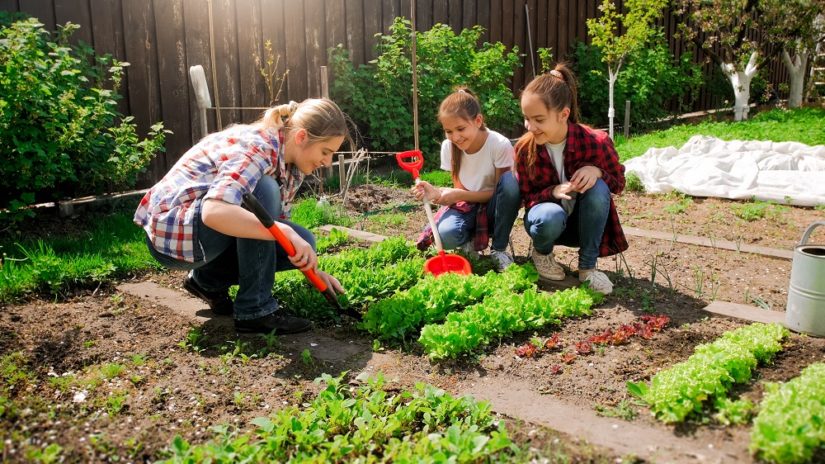We need to ‘grow more gardeners’ to avoid a crisis
Our young people have never been more disconnected from nature – and this threatens the nation’s gardens, according to a UK horticultural chief.
The country’s youngsters spend less than ever being active outdoors and in gardens. A generation is growing up with little or no idea of how to look after gardens and the lack of green skills means that with a few years’ time these spaces, so crucial to the overall balance in the environment, will be badly neglected.
Just as important as the contribution to natural balance is the health and well-being of young people. So, in all ways, the focus on passing on gardening skills is essential – and despite the desperate state of finances in the education sector, this must be a key focus.
That’s why Sue Biggs the Royal Horticultural Society’s director general has appealed for schools to teach gardening skills.
She said:
“In a few years’ time, we won’t have enough gardeners to keep the 22 million gardens in this country going, and that will only make environmental issues worse.”
In an interview with The Observer, she argued that few youngsters were being encouraged to take up gardening, although a career in horticulture would be perfect for any young person who was passionate about fighting the climate crisis.


570,000 jobs
This has had a knock-on effect in post-compulsory education, with many universities and colleges dropping horticultural science and botany courses. Yet, the horticulture industry supports around 570,000 jobs and is worth £24 billion a year to the British economy.
The RHS director general lamented the facts that the last five positions the society filled at the flagship garden in Surrey were all been given to people from overseas and feels that teachers and parents do not value gardening, while young people dismiss it as uncool.
She advises:
“We cannot find people who are British, trained at a British university. If we can make young people see that, by growing plants, they are helping the quality of our air and environment, and that will reduce the impact of climate change, then I think an awful lot of them will be much happier and feel less scared about the future.”
And while school budgets have never been more stretched than now, Sue Biggs argues that the cost of creating a school garden is not really a massive cash drain. All that is effectively needed is a few sleeper beds, compost and seeds.
After-school clubs
The extra strain comes in teachers’ time and timetable pressures. This means that any gardening is largely pursued in after-school clubs, run by teachers with a passion for the subject.
But there is missed opportunity here, as the garden environment is often ideal as an imaginative setting to teach other subjects, like maths, geography, science, history and art.
She argues:
“Teachers need to be imaginative and visit gardens and use gardening to demonstrate things already on the curriculum.”
The RHS actively supports teachers and schools with its “School Gardening” campaign and promotes the wide-ranging benefits. It says gardening:
- Improves physical and mental well-being
- Builds life skills such as confidence, teamwork and communication
- Enhances literacy, numeracy and oracy skills
- Enriches the entire curriculum from science, maths and geography, to art, design and languages
- Encourages a better and healthier lifestyle
- Teaches about the environment and sustainability
- Helps young people engage with their surroundings better and develop a sense of responsibility.
Beyond the school property, there are excellent opportunities to teach young people about horticulture through garden visits, igniting passion and ideas for these unique places that themselves are an undervalued gem in the UK economy.
Creative sector
This was underlined in a report published on Monday (July 22) by the Digital, Culture, Media and Sport Committee, which argued strongly that that gardens should be formally recognised as part of the UK’s creative sector.
The committee urges the government to launch a “UK Garden City” initiative to boost the support for garden tourism, which generates £3 billion a year for the economy, and makes wide-ranging recommendations to boost the untapped potential of sector.
Disconnection from nature
Further proof that disconnection with nature is a serious issue comes from recent research by the British Nutrition Foundation. This found that one in 10 of youngsters aged 11 to 14 did not know that carrots and potatoes grew underground.
The research, conducted as part of the BNF’s annual Healthy Eating Week, surveyed over 5,000 school children aged 5-16 years old, and found that more than one in ten 8-11 year olds think that pasta comes from an animal.
Almost a quarter (23%) of 5-7 year olds say that bananas, roast chicken, broccoli and wholegrain bread belong in the dairy and alternatives food group. A sixth (16%) reported that bread, yoghurt, chocolate and salmon belong in the fruit and vegetables food group.
This lack of basic knowledge is disturbing and advocates like Sue Biggs believe that urgent, visible action is needed. She suggested that young climate change activists should consider a “national day of garden protests” next.
She said:
“To improve our environment, you can either stop doing things, like purchasing single-use plastic, or you can start doing things, like gardening – or, best of all, do both.”
Want more articles like this?
The latest sustainability news straight to your inbox
Subscribe to Learn&Save